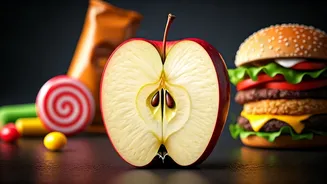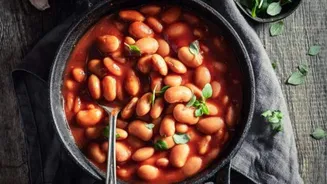What are UPFs?
Ultra-processed foods (UPFs) are industrially manufactured edible substances, often containing ingredients not typically found in home kitchens. These
include substances like modified starches, added sugars, and various additives, colors, and preservatives. These foods are designed to be shelf-stable, convenient, and often hyper-palatable, stimulating overconsumption. Examples include packaged snacks, sugary drinks, mass-produced baked goods, and many ready-to-eat meals. The processing methods used to create UPFs can strip away essential nutrients and fibers, which are replaced by artificial components. Regular intake of UPFs alters the body's metabolism and contributes to weight gain, chronic inflammation, and an increased risk of several diseases. A diet dominated by UPFs offers limited nutritional value compared to whole, minimally processed foods, setting the stage for long-term health problems.
Health Risks Unveiled
The consumption of ultra-processed foods has been consistently linked to a range of adverse health outcomes. Research suggests a strong correlation between high UPF intake and an increased risk of obesity, as the abundance of calories, sugars, and unhealthy fats in these products disrupts natural appetite regulation. Furthermore, regular consumption of UPFs is associated with a greater likelihood of developing type 2 diabetes. The high sugar content and the refined carbohydrates can lead to insulin resistance and impaired glucose metabolism. Cardiovascular diseases are another area of concern, as the ingredients often contribute to elevated cholesterol levels and blood pressure. Additionally, some studies have implicated UPFs in the development of certain types of cancer and can significantly worsen mental health issues, potentially exacerbating symptoms of anxiety and depression.
Dietary Strategies Explained
To mitigate the health risks associated with UPFs, it is crucial to implement specific dietary strategies. The primary goal should be to reduce the consumption of these products and shift the focus to whole, unprocessed foods. This includes prioritizing fresh fruits, vegetables, whole grains, lean proteins, and healthy fats. Careful reading of food labels is a vital step in identifying and avoiding UPFs. Become familiar with the ingredients list and watch out for artificial additives, excessive sugar, and processed fats. When shopping, focus on the perimeter of the grocery store, where fresh and minimally processed foods are typically located. Home cooking is another effective way to control the ingredients and reduce exposure to UPFs. Preparing meals at home allows for better control over portion sizes and the quality of ingredients, encouraging healthier eating habits.
Making Informed Choices
Making informed food choices is vital for overall health and well-being. Understanding the potential dangers of UPFs empowers individuals to make conscious decisions about what they consume. Start by becoming more aware of the ingredients in your food and choose products with fewer additives and a simpler ingredient list. Educate yourself on the nutritional value of different foods and prioritize nutrient-dense options. Learning to cook at home provides a powerful way to take control of your diet and avoid the pitfalls of pre-packaged meals. Consider consulting with a registered dietitian or nutritionist for personalized guidance. They can help you develop a tailored meal plan and offer valuable insights into making sustainable dietary changes. By adopting these strategies, you can improve your health and reduce the risks associated with ultra-processed foods.



















